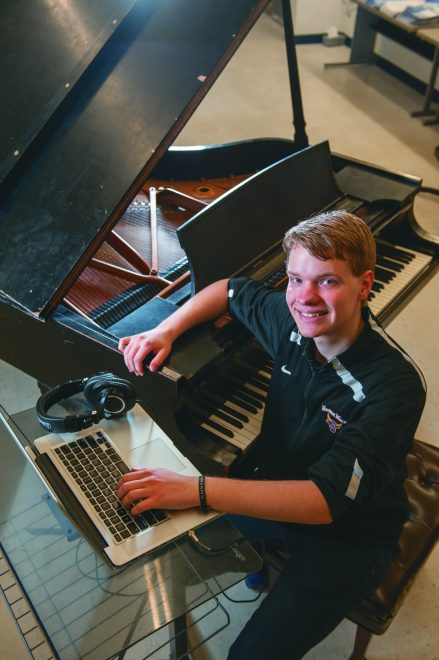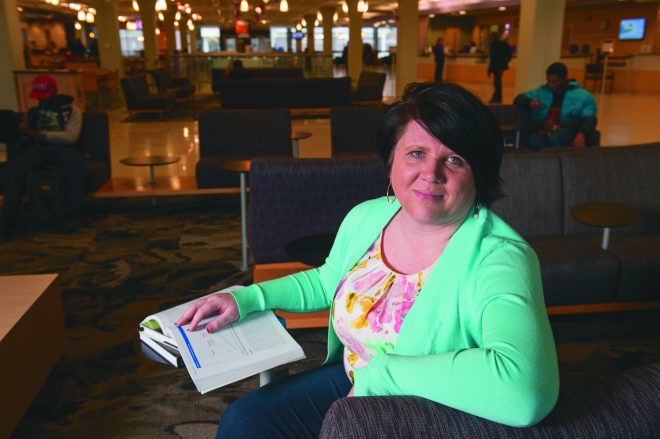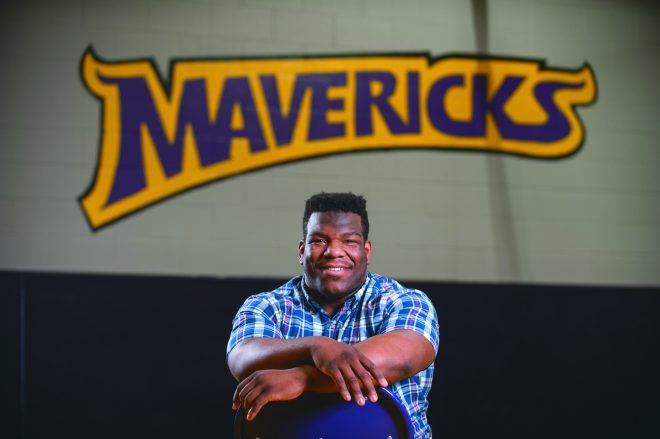 Making His Own Music
Making His Own Music
Shortly after enrolling at Minnesota State Mankato as a music major in 2013, Andrew Grabowska discovered something potentially disastrous about his piano playing.
“I have terrible performance anxiety,” he recalls. In junior and
senior high music events, the St. Clair, Minn., student always seemed to get hit with the nerves. While fine in rehearsal, playing at competitions brought on trembling hands, missed notes and memory lapses.
When he enrolled at Minnesota State Mankato intending to pursue a bachelor’s degree in music, he hoped to have those days behind him. Grabowska’s one-on-one piano courses went well—until it was do-or-die time to perform for grades.
“All of a sudden the music I knew so well in my lessons just went out the window,” Grabowska says. “I couldn’t do it at all. I’d forget sections. I’d play poorly. … I realized that I can’t do this as a living if this is such a hindrance for me.”
With performance out of the picture, Grabowska did some soul-searching and realized his true passion in music was on the composing side. More specifically, composing for specific events, such as film, video games or marching bands and drum corps. In an ideal world, the University would offer a degree in writing and composing for film and video games. It would be a degree that offered courses in sound engineering, licensing and recording.
But the University has no such degree. So Grabowska created one.
The young composer graduated this year with a degree in Interdisciplinary Studies. It may sound like nine syllables of vagueness, but for a growing number of students, the degree program provides specific and specialized experiences toward jobs and careers that aren’t represented by one of the traditional majors offered by the University.
Previously known as Open Studies, Interdisciplinary Studies allows students to take classes from three distinct areas of study and combine them into a customized degree.
For transfer students, student athletes and students, like Grabowska, who discover a snag in their pursuit of a more traditional degree, the Interdisciplinary Studies major provides an opportunity to customize a program when the perfect program doesn’t technically exist.
In Grabowska’s case, he took select courses in music, music industry and film—three distinct majors—that together propelled him toward his goal of composing for special events and projects. He graduated this year among a handful of other students majoring in Interdisciplinary Studies.
That number is going to grow, says Kristen Treinen, who’s been director of Interdisciplinary Studies since 2013. “It’s growing and people are finding out more about it,” Treinen says. Also an associate professor in Communication Studies, Treinen is currently helping 10 students work on the program’s required capstone experience. In 2013, she helped one.
Capstone projects can involve internships, teaching or immersion in a specified group of classes. Treinen also requires a three-pronged communications project: Write a paper defining how the three areas of study work together; create a website that explains their expertise; and apply for an actual job, including creating a LinkedIn profile and rehearsing the application and interview process.
These three requirements get at the core of one of Treinen’s concerns about the program. It’s critical that graduates be able to describe a degree titled Interdisciplinary Studies to an employer who might not understand that it is actually a customized, specialized degree and not a generalized or open area. “What I have them do is articulate how their three areas actually intersect,” Treinen says.
As director of the Interdisciplinary Studies major, her work with the students is in an individual study format. “They come in, they ask questions, I get them enrolled, I figure out what their plan of study is going to look like, how many credits they have,” she says. “It has to be very much hands-on. There’s some freedom to it but we have to make sure it makes sense for what they’re doing.”
 Returning with a Plan
Returning with a Plan
Tammy Bohlke, 37, recently returned to school more than a decade after leaving without completing a degree.
After graduating from high school in Pine City, Bohlke entered community college to study accounting. Although she had enjoyed accounting in high school, her interest faded the more she got into it. As she was re-evaluating her career options, most of her friends were moving on to four-year colleges to complete their degrees.
“I don’t know if it was just me not being fully invested in college at the time, my friends moving away or all of the above. It just wasn’t my time,” Bohlke says.
Thirteen years ago, she took a job as an administrative assistant at Minnesota State Mankato; since then she has worked in several different offices that serve students and alumni. Her current position in University Extended Education allows her to serve students who are often like her—older and eager to finish a degree.
Her job at the University gave her a unique vantage point to learn about career paths that might appeal to her, from nonprofit leadership and event planning to advising students. As her vision for her future evolved, so did the classes for which she registered. Between her community college credits and the credits she was accumulating at Minnesota State Mankato, the interdisciplinary approach looked like it might be the best way to finish her bachelor’s degree—and so she contacted Treinen.
“She said I was the perfect candidate for why this degree was formed,” Bohlke says.
Bohlke was able to pair the credits she had earned in Recreation, Parks and Leisure Services with credits in Health and Nonprofit Leadership.
“It worked perfectly for me,” she says. “Those were three fields I enjoyed and was invested in. It was the right time for me to go to college. They also had a lot of nighttime and online classes, so that was perfect for a non-traditional student.”
Her capstone project was co-teaching a course that prepares students for careers in business. She enjoyed the class so much she’s teaching it again.
“I’m so glad I had this degree that let me kind of just create that [capstone project]. I wasn’t told, ‘Go do an accounting internship.’ I was able to put everything I like into this.”
After graduation this May, Bohlke began pursuing a master’s degree in Educational Leadership at Minnesota State Mankato. Her goal is to eventually work as an advisor to college students. She thinks she’ll be able to relate well to students who are uncertain about navigating college.
“I was that student who stopped going to school because I didn’t have a mentor or advisor,” she says. “I think I have the right story to help some of those students.” Last summer, she volunteered to help undecided students during new-student orientation. That experience affirmed her belief that Interdisciplinary Studies would work just as well for incoming first-year students as it does for non-traditional students.
“Some people come here and don’t know what to do,” she says. “Sometimes it’s just like ‘Hey, your common theme here was health. Let’s look at what health majors we actually have…’ Sometimes it’s that one-on-one personal connection.
“It’s so fun to hear the students say, ‘Have you ever been undecided?’’” she adds with a laugh. “I’m a 37-year-old undergrad student. You have no idea.”
 Finding a Focus
Finding a Focus
Maverick heavyweight wrestler Malcolm Allen grew up in New Rochelle, N.Y, where he attended youth camps every summer. He credits those sports camps with guiding him away from bad influences and toward goals such as college.
He attended Nassau Community College for a year in Long Island, N.Y., then spent two years at Iowa Central Community College. That’s where he decided to pursue a goal of being a college wrestling coach as well as a camp director. He assumed he’d need a degree in physical education, so he turned to Minnesota State Mankato.
Allen was drawn to Mankato after talking with wrestling coach Jim Makovsky about being a student athlete. “His energy and his goals that he set for me were everything I wanted for myself as well,” Allen says. “The thing he was most concerned about was the schooling—he wanted me to graduate and graduate on time. No other coach really spoke about that, about schooling and graduating. Everybody else was just worried about me wrestling for them.”
But Allen found that it was all going to be more time consuming than he expected.
He was stressing and his classes were getting ahead of him. It was Makovsky who suggested Interdisciplinary Studies.
“I sat down with Coach Makovsky and we had a three-hour talk about how I should switch to Interdisciplinary Studies and I did,” Allen says. “I don’t regret it at all. I love my class, I love everybody I met.”
He took courses from Recreation, Parks and Leisure Services (RPLS), Communication Studies and Health, all toward the goal of coaching in college. He graduated this spring.
“I was telling coach how I wanted to make a wrestling club and maybe a wrestling camp for the summers, and that’s where the RPLS side comes from. I went to a bunch of camps as a kid— every summer I was in a camp—and I think that helped me a lot in becoming who I am.
“I could have fallen into the wrong hands of society,” Allen adds. “I just want to create the opportunity for other kids to do the same thing, to go down the right path in life.” —Joe Tougas
Speak Your Mind